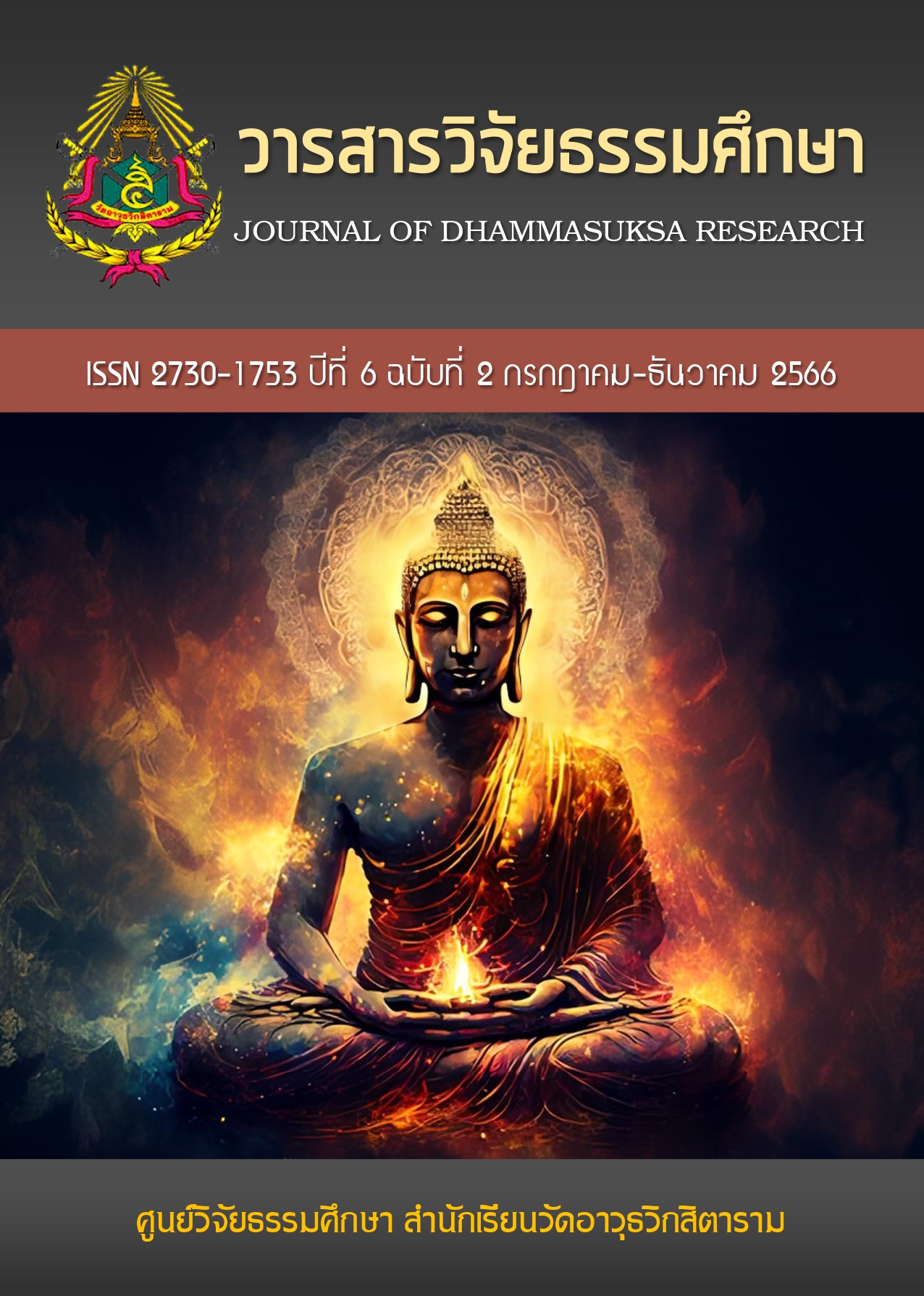การวิเคราะห์การจัดการเรียนการสอนไตรสิกขาตามแนวคิดปรัชญาหลังนวยุคสายกลาง
คำสำคัญ:
วิธีการจัดการเรียนการสอน, ไตรสิกขา, ปรัชญาหลังนวยุคสายกลางบทคัดย่อ
การจัดการเรียนการสอนตามหลักไตรสิกขาที่ผ่านมาเป็นการนำคำว่า ศีล สมาธิ ปัญญา มาใช้ในการจัดการเรียนการสอน มีวิธีการสอนที่ส่งเสริมการพัฒนาศีล สมาธิและปัญญา ปรัชญาหลังนวยุคสายกลางเป็นปรัชญาที่เน้นที่การพัฒนาคุณภาพชีวิตและเป็นปรัชญาที่เปิดใจกว้าง ยอมรับความคิดเห็นที่แตกต่างหลากหลาย หากนำปรัชญาหลังนวยุคสายกลางมาใช้ในการจัดการเรียนการสอนร่วมกับหลักการไตรสิกขา น่าจะเป็นประโยชน์ในการจัดการเรียนการสอนยิ่งขึ้น ผู้วิจัยจึงต้องการวิเคราะห์ความสอดคล้องของแนวคิดในการจัดการเรียนการสอนของหลักการไตรสิกขากับปรัชญาดังกล่าว งานวิจัยนี้มีวัตถุประสงค์คือ 1) เพื่อวิเคราะห์แนวทางการจัดการเรียนการสอนตามหลักการไตรสิกขาที่สอดคล้องกับปรัชญาหลังนวยุคสายกลาง 2) เพื่อประยุกต์ใช้ไตรสิกขาเพื่อพัฒนาคุณภาพชีวิตตามหลักปรัชญาหลังนวยุคสายกลาง การวิจัยนี้เป็นการวิจัยเชิงปรัชญา (Philosophical research) โดยใช้วิธีการวิเคราะห์เอกสาร (Document analysis) พิจารณาจำแนกหลักการไตรสิกขา วิธีการสอน แนวคิดเบื้องหลังการสอน และแนวคิดปรัชญาหลังนวยุคสายกลางที่เกี่ยวข้อง ผู้วิจัยพบว่าหลักการไตรสิกขาเมื่อนำมาการจัดการเรียนการสอนแล้ว วิธีสอนตามหลักการไตรสิกขา มีแนวคิดเบื้องหลังที่สอดคล้องกับแนวคิดปรัชญาหลังนวยุคสายกลาง ซึ่งสามารถจำแนกวิเคราะห์ตามองค์ประกอบของไตรสิกขาได้คือ การสอนศีลเพื่อพัฒนาคนให้เป็นปกติ อยู่รวมกันอย่างสงบสุข สอดคล้องกับการปรัชญาหลังนวยุคสายกลางเรื่องการเสริมสร้างสันติภาพ เอกภาพบนความหลากหลาย การสอนสมาธิเพื่อความตั้งมั่นในความสงบใจ สอดคล้องกับปรัชญาหลังนวยุคสายกลางเรื่อง การเกิดสันติภาพภายใน การสอนปัญญาเพื่อได้ความรู้ ความทรงจำ ความเข้าใจ และสามารถเลือกตัดสินใจเพื่อแก้ไขปัญหาต่างๆโดยใช้หลักธรรมและคุณธรรมในการแก้ปัญหา สอดคล้องปรัชญาหลังนวยุคสายกลางคือความไม่ยึดมั่นถือมั่น เปิดรับความคิดต่างๆด้วยใจเปิดกว้าง และแสวงหาความรู้และคำตอบเพื่อพัฒนาคุณภาพชีวิต การประยุกต์ใช้ไตรสิกขาเพื่อการพัฒนาคุณภาพชีวิตของผู้เรียนโดยผ่านกิจกรรมที่เกี่ยวข้องกับการวิเคราะห์ วิจักษ์ และวิธาน พัฒนาคุณภาพชีวิตของครูผู้สอนผ่านกิจกรรมการอบรมครู ผู้วิจัยได้สรุปความเข้าใจในการนำหลักการไตรสิกขามาใช้ร่วมกับปรัชญาหลังนวยุคสายกลางเป็นรูปแบบของตาราง เพื่อความสะดวกในการนำไปประยุกต์ใช้ต่อไป
เอกสารอ้างอิง
กีรติ บุญเจือ. (2545). ปรัชญาหลังนวยุคแนวคิดเพื่อการศึกษาแผนใหม่. กรุงเทพฯ: สำนักพิมพ์ ดวงกมล.
กุลิสรา จิตรชญาวณิช. (2563). พิมพ์ครั้งที่ 2. การจัดการเรียนรู้. กรุงเทพฯ:สำนักพิมพ์จุฬาลงกรณ์ มหาวิทยาลัย
บรรพตี รำพึงนิตย์ม, รวิช ตาแก้ว และกีรติบุญเจือ. (2563). การพัฒนาคุณภาพชีวิตตามหลัก ปรัชญาปารมีตาในทรรศนะปรัชญาหลังนวยุคสายกลาง วารสารการวิจัยการบริหารการพัฒนา. 10(4).
พจนา มาโนช. (2562). มรดกเชิงพลวัตผ่านกระบวนทรรศน์ทั้งห้ากับการแก้ไจทุจริต : การศึกษาเชิงวิเคราะห์ วิจักษ์ และวิธาน. ปริญญาดุษฎีบัณฑิต : บัณฑิตวิทยาลัย มหาวิทยาลัยราชภัฏสวนสุนันทา.
สมาคมผู้ปฏิบัติ. (2545). คั้นออกมาจากศีล. กรุงเทพฯ: ฟ้าอภัยจำกัด
สำนักทดสอบทางการศึกษา สพฐ.. (2555). คู่มือประเมินสมรรถนะสำคัญของผู้เรียนระดับการศึกษาขั้นพื้นฐาน ตามหลักสูตรแกนกลางการศึกษาขั้นพื้นฐาน พุทธศักราช 2551 ชั้นมัธยมศึกษาปีที่ 3. กรุงเทพฯ: โรงพิมพ์สำนักงานพระพุทธศาสนาแห่งชาติ
สำนักคอมพิวเตอร์ มหาวิทยาลัยมหิดล. พระไตรปิฎก ประมวลคัมภีร์ และแหล่งค้นพุทธศาสตร์ ฉบับคอมพิวเตอร์ ( BUDSIR VI for Window ). CD-ROM, 2550.
ดาวน์โหลด
เผยแพร่แล้ว
รูปแบบการอ้างอิง
ฉบับ
ประเภทบทความ
หมวดหมู่
สัญญาอนุญาต
ลิขสิทธิ์ (c) 2023 วารสารวิจัยธรรมศึกษา

อนุญาตภายใต้เงื่อนไข Creative Commons Attribution-NonCommercial-NoDerivatives 4.0 International License.



